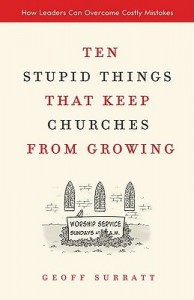I just finished reading Ten Stupid Things That Keep Churches from Growing: How Leaders Can Overcome Costly Mistakes by Geoff Surratt. Geoff is the Pastor of Ministries at Seacoast Church which has several different campuses throughout South Carolina and neighboring states. His brother, Greg Surratt, is the founding pastor of Seacoast. This was the first book that I read from start to finish on my new Kindle. I downloaded this book one day when they made it available for free. I had heard great things about the book and was pumped to find it for free.
I know that this book was written geared towards churches and church leaders. However, I believe that a lot of these truths are transferrable to my leadership position at a Christian school as well as in the opportunities I have within our local church. This book was a very easy read and was a nice mix of relatable illustrations and “in your face” practical advice. I would recommend this book for anyone who is in a position that calls for leading people in just about any setting.
Here are some of my takeaways that I highlighted while reading:
- “While the best technology in the world will never win someone to Christ, bad technology can erect barriers between the gospel presentation and the outsider in the pew. Be sure to find the money in the budget to tear those barriers down.”
- “Americans don’t do boring. They will put up with heresy, lies, and deception; but if you bore them, they will check out immediately. It is not the purpose of church to entertain the congregation, but if we don’t engage their imaginations, we will never reach them. Americans are bombarded all day every day by creative media coming from every direction. To cut through the noise, we have to get creative.”
- “If we are going to improve our weekend services, we have to make sure everything we do from the platform is purposeful.”
- “To reach children in their formative years, we have to create environments that are geared to today’s children and build a curriculum that relates to what they understand and are interested in.”
- “I heard Reggie Joiner explain it this way at a recent North Point Community Church children’s conference: “Do not beg people to volunteer in children’s ministry. You need to know that your potential team members’ need to volunteer is bigger than your need to have a warm body in the room.””
- “We’re not in competition with the church down the street. Culturally, we’re going head-to-head with Disney.”
- “Why do we promote talent over integrity? How do we detect when there might be an integrity problem? What do we do when we discover that a leader has integrity issues?”
- “Talent is a good thing and a gift from God; the problem is when we let talent trump integrity.”
- “We shouldn’t let critics assassinate our leaders, but we do need to listen when we hear similar complaints from more than one person. Where there’s smoke, there may not be fire, but there’s probably some kind of spark.”
- “If their lives seem out of balance, ask them to give an accounting of their time. If they seem to exhibit an unusual attraction to the opposite (or same) sex, ask them about their intimate life. If they have gaps in their schedule that are hard to explain, ask them to tell you where they’ve been. If they seem on top of the mountain part of the time and in the depths of the valley at others, explore that tendency with them as well. When at all possible, have at least one or two others with you for these conversations, and listen with your heart and your head. Ask God to give you discernment, and go beyond what you want to hear to find out the truth. If you are still uneasy after one of these encounters, God is probably revealing something that will have to be dealt with.”
- “The best safeguards are consistent and honest conversations in relationships between people who really care about each other.”
- “That’s how new people feel when they drive up to your building and see uncut grass, flower beds in need of weeding, and faded paint. When they go inside and find decor that dates from the 1980s and a sound system that was state-of-the-art when Nixon was still erasing audio tapes, they wonder if anyone is aware that the turn of the century was almost a decade ago. Why would they trust you with their spiritual lives if you don’t take care of the things God has already entrusted to you? How could you relate to their lives when you seem to be living in another era?”
- “The challenge is when we stop learning and start leaning; when we try to simply copy what we’ve seen in another successful ministry. Each one of us has been created in a unique way and given unique resources to reach a unique community. One of the theme verses of my life comes from Paul’s letter to the Ephesian church: “For we are God’s workmanship, created in Christ Jesus to do good works, which God prepared in advance for us to do” (Eph. 2:10).”
- “To be effective in our place of ministry, we must first come to an intimate knowledge of the surrounding community.”
- “There is no substitute for a leader’s time alone with God, seeking his direction and his heart for the community in which they live.”
- “The key to effective team-based ministry is to remember that leaders lead and teams follow. When teams lead, you have chaos; when leaders follow, you have confusion.”
- “A confident leader with a compelling vision will take a team to places they could never get to on their own.”
- “If we continue to do church the way we have always done church, we will never reach our world in the way we have been called. Statistics show that in spite of the megachurch movement of the last twenty years, more and more Americans are walking away from church and away from a relationship with Jesus. Through strategic partnerships in which churches stop competing and start cooperating, we might be able to reverse that trend.”



